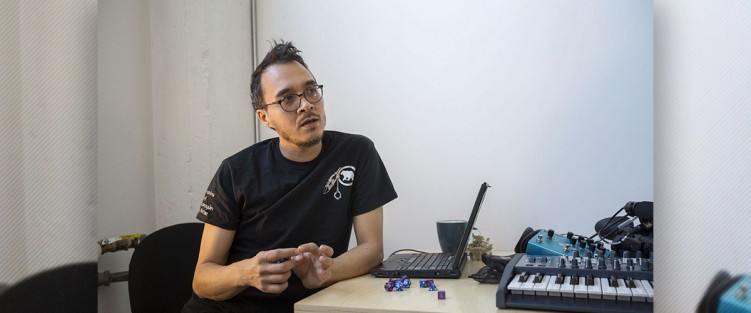 In November 2005, the non-profit Canadian New Music Network (CNMN) / Réseau canadien pour les musiques nouvelles (RCMN) was founded with a mandate to foster community-building, networking and to broaden awareness of new music activity. It’s an organization that is designed to support those involved in the pursuit of creative art music and sound art within Canada, including creators, performers, presenters, music educators, musicologists, and others. One of their activities is to present a bilingual and biennial CNMN Forum, held this year in Regina, Saskatchewan from May 21-24, 2020, on Treaty 4 Territory, the traditional territory of the nêhiyawak (Cree), Anihšināpēk (Saulteaux), Dakota, Lakota, and Nakoda, and the homeland of the Métis/Michif Nation. Titled “Listen up / Tendez l’oreille,” this year’s Forum will be focused on five streams: Accessibility, Community, Indigenous Resurgence, Land, and Technology-Innovation.
In November 2005, the non-profit Canadian New Music Network (CNMN) / Réseau canadien pour les musiques nouvelles (RCMN) was founded with a mandate to foster community-building, networking and to broaden awareness of new music activity. It’s an organization that is designed to support those involved in the pursuit of creative art music and sound art within Canada, including creators, performers, presenters, music educators, musicologists, and others. One of their activities is to present a bilingual and biennial CNMN Forum, held this year in Regina, Saskatchewan from May 21-24, 2020, on Treaty 4 Territory, the traditional territory of the nêhiyawak (Cree), Anihšināpēk (Saulteaux), Dakota, Lakota, and Nakoda, and the homeland of the Métis/Michif Nation. Titled “Listen up / Tendez l’oreille,” this year’s Forum will be focused on five streams: Accessibility, Community, Indigenous Resurgence, Land, and Technology-Innovation.
As I read the details on each of these topics, I was encouraged to see that conversations of this nature are now being considered within the new music community. The various presentations this year will address such issues as how we incorporate our listening and presencing skills as well as ecological activism into music-making, how the music community can respond to the Truth and Reconciliation Commission Calls to Action, the celebration of the ways music can be experienced beyond the concert hall, and how more inclusive audiences can be built in the dissemination of experimental music and sound art forms.
I spoke with CNMN executive director Terri Hron to find out more about the nature of this year’s Forum. In previous years there have been conversations around issues of diversity, environmental sustainability and the social impacts of a musical practice, she told me. When Hron was hired a few years ago, her goal was to continue those conversations and expand them to include larger cultural issues, including taking concrete steps towards responding to the Truth and Reconciliation Commission. She stated that questions such as “what does having right relations with Indigenous communities mean in the context of music-making?” and “how can we create more events that are Indigenous-led and work in good ways as allies with Indigenous artists?” will be part of the conversation at the Forum, with a goal to design an action policy regarding these issues.
Most of the presenters were selected by the Forum’s advisory committee members as well as by a jury that selected from an open call. Olivia Shortt, a Tkarón:to-based artist and currently involved at Toronto’s Music Gallery as an Artistic Associate, was one of three jury members that helped select from the submissions. I asked Shortt about some of the proposals that stood out for her.
The Vancouver-based Astrolabe Musik Theatre was one of her mentions; they will be presenting their documentary film entitled The Lake / n’-ha-a-itk, made in collaboration with artists from Westbank First Nation. The film integrates an opera composed by the late BC composer Barbara Pentland with syilx/Okanagan culture, music, language and dance. A presentation by Kayla McGee, the current executive director of the Music Gallery (and a leader in the Music Gallery’s partnership with The Dandelion Initiative, an organization committed to creating safe and inclusive spaces, including performance venues) was another of Shortt’s picks. McGee’s topic is entitled “Beyond EDI,” and tackles how we can expand our understanding of the principles of equity, diversity and inclusivity.
Shortt also spoke about a performance entitled Aspects of Trees, a collaboration between Newfoundland-based composer/technologist Teresa Connors and New Zealand filmmaker Andrew Denton that gives attention to the escalating pine beetle epidemic that has decimated forests on the west coast of North America. The work includes video footage of the forests and audio captured from the tree bark and inside the trees. The performance will be an improvisation between Connors using her laptop-based tree instrument and Ellen Waterman (Ottawa) on flute, who will also be presenting as part of the accessibility session. During this panel, Waterman will discuss her involvement with the Adaptive Use Musical Instrument (AUMI), a project founded by the late Pauline Oliveros, and the recent developments of a vocal version to explore issues of accessibility in choral music. Geronimo Inutiq, originally from Iqaluit and now Montreal-based, will be discussing his process and approach to electronic music production and performance, highlighting his ideas around interconnectivity and independent music production in a post-internet age.
These are just a few of the presenters; listings of the full CNMN Forum program can be found on the CNMN website, and profiles of many presenters on the CNMN’s Facebook page.
The good news is that if you are interested in attending, for the first time, the CNMN is offering financial assistance for travel for select attendees. Terri Hron emphasized during our conversation that the application process is very simple and is open to anyone who wishes to attend. The deadline is coming up on April 1; you can find application information on the CNMN website. This Forum promises to bring the conversation around music and sound-based artistic practices to a new level.
At the time of publication, the CNMN has released this statement on their website regarding the future scheduling of the conference given the current global coronavirus COVID-19 pandemic: “CNMN is monitoring the development of and response to COVID-19 and will be updating here if there are any changes to the Forum. Registration will open April 1.”
Wendalyn Bartley is a Toronto-based composer and electro-vocal sound artist. sounddreaming@gmail.com.



